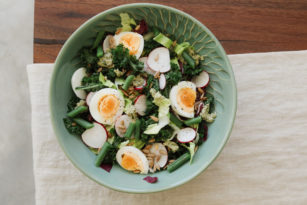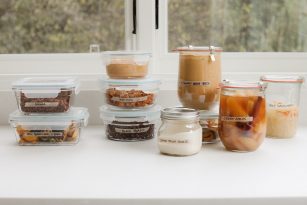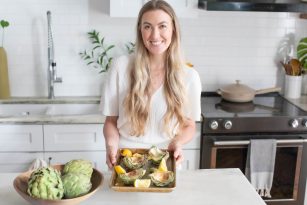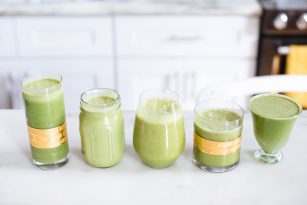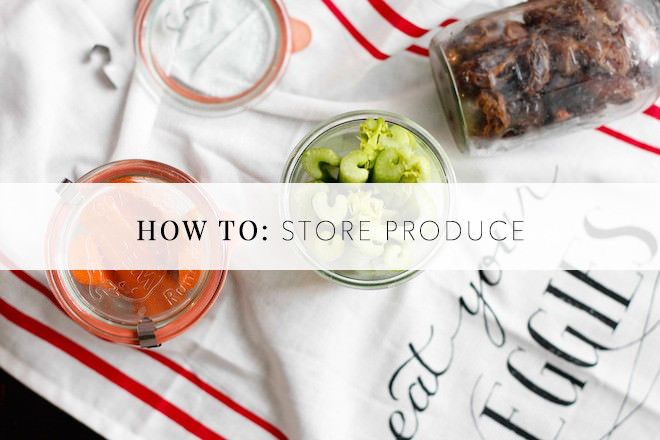
We’ve all experienced it at one point in time, we’ve just brought home a haul of fresh fruits and vegetables only to notice several days later some of them are going bad, getting mushy, and headed straight for the trash can (or compost). This is something I used to experience all the time especially when I first started grocery shopping and cooking for myself in college. I never knew how to properly store fresh fruits and vegetables to maximize their life, nutrition, texture, and taste. Today I’m going to share with you all my top tips learned over the years that I use weekly after my grocery shopping/market trips to keep my veggies and fruits fresh!
First let’s start with the basics of knowing what fruits and vegetables to store cool in the refrigerator compared to those that need to be stored on the countertop/pantry and which should never be stored close by. A general rule of thumb, is to not store fruits and vegetables together or in the same drawer. Fruits give off a natural gas called ethylene, which is a ripening agent, but this can actually spoil vegetables that are stored next to the fruits. I find it best to designate drawers and spots in the fridge only for vegetables, then spots only for fruits, and then of course other areas for prepared foods, drinks, etc.
Before you get started thinking about what to store on the countertop and what to store in the fridge, step 1 is a Pantry Makeover/clean out, then organize your pantry, and clean out the fridge. These all may seem like very simple steps, but I promise they’ll keep the food fresher by encouraging you to use what you’ve bought first (first in, first out rule).
Tip: When planning meals out for the week, write down how much of each food you may be using- this not only helps you stay on track, keeps it budget friendly, but also “forces” you to enjoy the food you have at home without wasting fresh produce. If you’re still having a hard time meal planning, check out this downloadable guide.
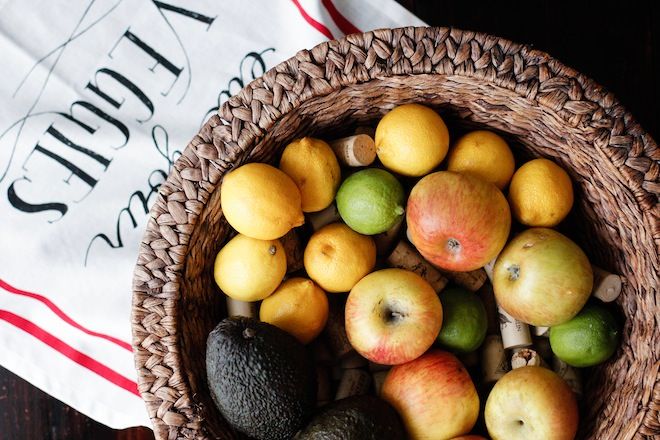
How to store produce
FRUITS
If the fruit isn’t ripe, leave it on the countertop in your fruit/ripening basket for several days until ripened. See list below of which fruits should be refrigerated.
VEGETABLES
First, remove any bags, ties, etc. that may be holding the vegetables together. Next, rinse well all the vegetables (except for mushrooms, berries, and herbs- these will spoil quicker if rinsed first) and store them in containers or ziploc bags with a little slot open for the exchange of air/gas.
Refrigerate
- Apples (keeps for about a 1-3 weeks)
- Apricot (5 days or ripen on countertop)
- Artichokes (1 week)
- Arugula (1 week)
- Asparagus (3 days)
- Beets (3 weeks, wash well and store root and leaves separately)
- Bell peppers (5-7 days)
- Blackberries (2-3 days, remove moldy ones)
- Blueberries (5-7 days, remove moldy ones)
- Cruciferous: broccoli, broccoli raab, brussel sprouts (1 week)
- Cabbage (1-2 weeks)
- Cantaloupe (5 days)
- Carrots (1 week)
- Celery (1 week, rinse well)
- Chard (3 days)
- Cherries (3 days in an open bag, bowl or tray)
- Clementines (5 days)
- Corn (best the day of)
- Cranberries (1 month)
- Cucumber (5-7 days)
- Eggplant (5 days)
- Endive (5 days)
- Fennel (1 week)
- Figs (
- Ginger (3 weeks)
- Grapefruit (3 weeks, 1 week on countertop)
- Grapes (3-5 days in an open bowl)
- Green beans (1 week)
- Herbs (5 days, stored upright in a mason jar with cold water, bag on top)
- Honeydew (5 days)
- Jicima (1 week)
- Kale (3 days)
- Kiwis (4 days)
- Leeks (1 week)
- Lettuces (5-7 days)
- Mangoes (4 days or ripen on countertop)
- Mushrooms (1 week in paper bag, do not rinse beforehand)
- Nectarines (5 days)
- Onions, cut (4 days)
- Oranges (2 weeks)
- Peaches (5 days)
- Pears (5 days)
- Peas (4 days)
- Pineapple (5 days)
- Plums (5 days)
- Pomegranate, whole (3 weeks)
- Radicchio (4 days)
- Radish (4 days)
- Raspberries (2-3 days, remove moldy ones)
- Rhubarb (1 week)
- Scallions (5 days)
- Snow peas (4 days)
- Spinach (3-5 days)
- Summer squash (5 days)
- Sugar snap peas (4 days)
- Tangerines (1 week)
- Watercress (4-6 days)
- Watermelon, whole (1 week)
- Zucchini (5 days)
Don’t refrigerate (i.e. pantry or countertops)
- Avocados (3 days or ripen on countertop)
- Bananas, unripe (ripen on countertop or put used bananas in fridge)
- Nectarines (2-3 days or until ripe)
- Peaches (2-3 days or until ripe)
- Pears (2-3 days or until ripe)
- Plums (2-3 days or until ripe)
- Tomatoes (3-4 days)
- Garlic (about 2 months)
- Lemons (1 week)
- Limes (1 week)
- Onions (2 months whole)
- Pineapple (2-3 days ripen)
- Potatoes: sweet, red, yukon gold, fingerling, white (3 weeks)
- Rutabaga (1 week)
- Shallots (1 month)
- Winter squash: butternut, acorn, delicata, spaghetti (3 months)
Store alone
These will absorb other flavors or odors in the same storage unit or have the potential of spoiling/over-ripening
- Bananas, ripe
- Broccoli
- Brussels sprouts
- Cabbage
- Carrots
- Cauliflower
- Cucumbers
- Eggplant
- Lettuce and other leafy greens
- Herbs like parsley, cilantro, and mint
- Peas
- Peppers
- Squash
- Sweet potatoes
- Watermelon
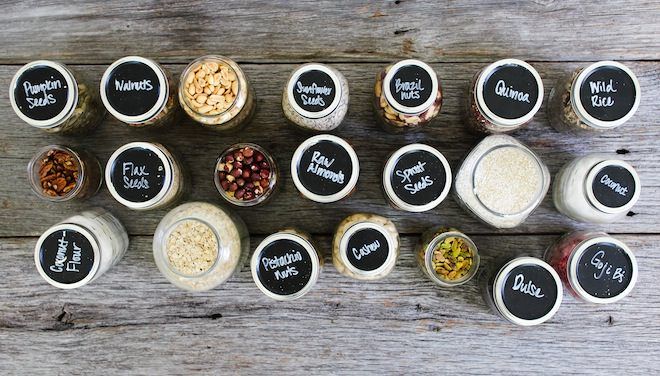
ADDITIONAL TIPS
- Vegetables // If I’m on the go or need quick snacks, I’ll often slice or chop up veggies (like cucumbers, zucchini, celery sticks, and carrot sticks) and store them in airtight Weck jars.
- Fruits // More often than not, I ALWAYS keep fruit on the countertop unless I’ve cut into it. I recommend eating fruit at its ripest state!
- Others // In the fridge, usingMason jars or good ole’ Weck jars I store dates, soaked almonds, seeds, flours, juices, and smoothies that I’ve made to keep them incredible fresh.
WHAT TO STORE PRODUCE IN
- Mason jars (great for canning, smoothies, juices, and storing all dry goods such as grains, legumes, nuts, and seeds)
- Good ole’ ziploc bag (although I’m not a huge fan of using plastics around food, these do the trick)
- Weck jars (these are my absolute favorite and come in all shapes!)
- Cloth food bags
- Glass containers
- BPA free plastic containers
Ripening tips // bananas stored next to any other fruit will quicken the overall ripening process of said fruit, i.e. bananas help ripen fruit very quickly!
Nutrition Stripped news: Check out my interview I did with Career Contessa all about how I started my career and Nutrition Stripped!
xo McKel



